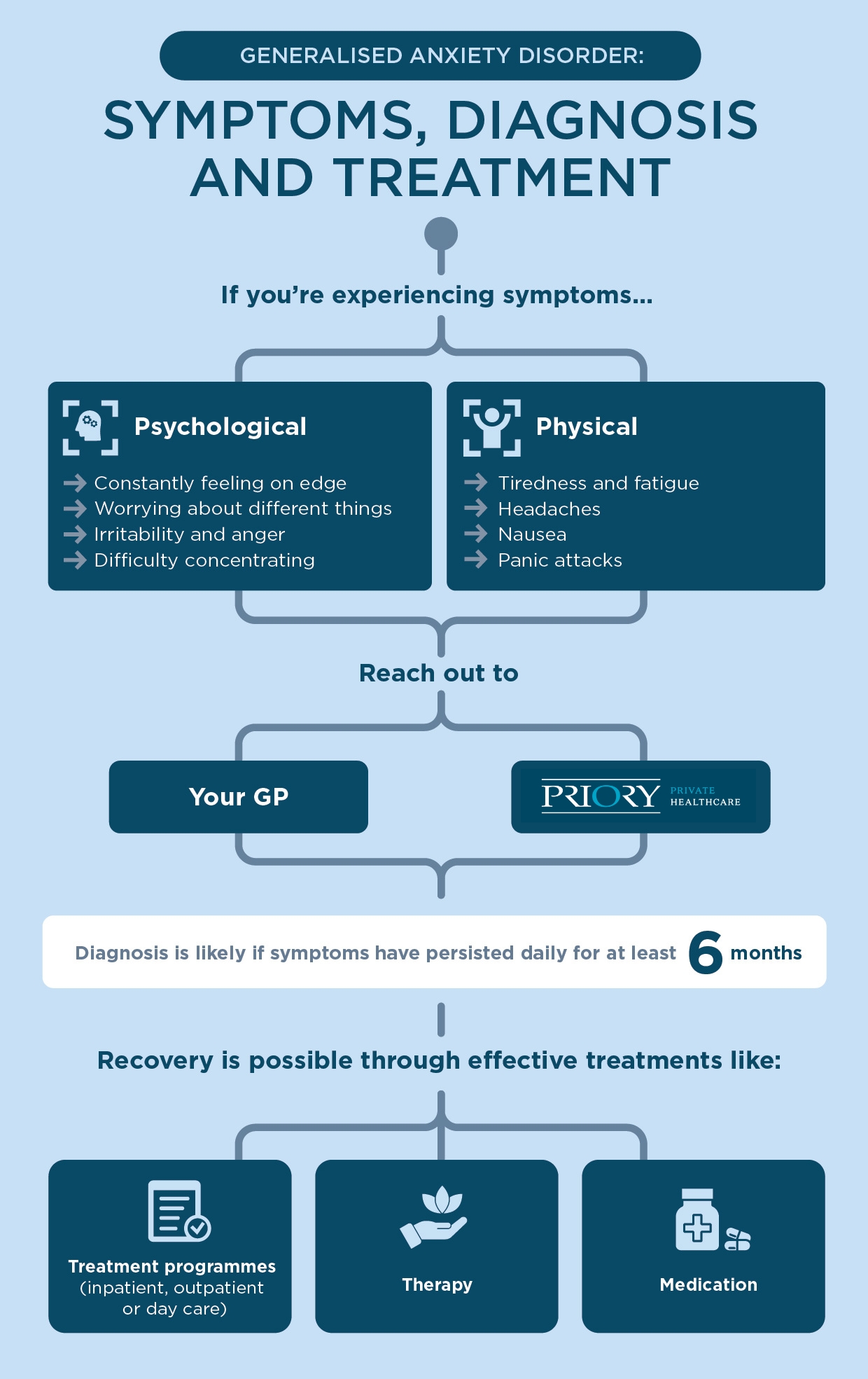Generalised anxiety disorder (GAD): symptoms and treatment
If persistent worry is affecting your life, understanding the symptoms of GAD is an important step towards finding the right support..
If persistent worry is affecting your life, understanding the symptoms of GAD is an important step towards finding the right support..


Generalised anxiety disorder (GAD) is a type of anxiety that can cause people to worry constantly about lots of different things, and find it very hard to relax or ‘switch off’. If you’re struggling with GAD, you might spend a lot of time worrying about anything from your physical health, the safety of your loved ones, and what other people think of you, right through to things like world politics and environmental issues. Sometimes, people with GAD are unable to articulate what they’re worried about, but just have a constant sense of unease that something bad is going to happen.
While it’s normal to feel anxious every now and then, people who struggle with GAD find that they tend to worry constantly about anything and everything, as opposed to having a particular trigger. This can go on for months or even years at a time. In addition, their worrying is out of proportion to the situation and very often, people with GAD actually recognise that there’s nothing to worry about, but they still can’t switch off their anxious thoughts.
Here, we explore the symptoms of GAD, provide some coping strategies for GAD and look at the many treatment options that are available. GAD can be a long-term condition that can interfere with lots of different areas of your life. However, it’s important to remember that it’s treatable and we can help you recover.
The symptoms of GAD can be very persistent and can prevent you from functioning effectively in your day-to-day life. Some of the most common symptoms of GAD include:
Another core feature of GAD is an intolerance of uncertainty. This can cause people to feel distressed when they’re faced with ambiguity or ‘the unknown’. People with GAD often struggle with an overwhelming need for certainty and can find the unpredictability of life profoundly unsettling. This intolerance can affect lots of areas of their daily life, from decision making to planning for the future, and uncertainty can become a major trigger for anxiety. As a result, people with GAD may engage in constant reassurance-seeking or avoidance behaviours in order to reduce their discomfort. However, these coping mechanisms can often reinforce the cycle of anxiety.

Coping with anxiety can seem impossible but there are a number of simple steps you can take to help you manage GAD:
While the above tips can help, GAD often needs professional treatment. That’s why it’s so important that you get the help you need. A good first step may be for you to make an appointment to see your GP. They’ll be able to evaluate your symptoms and either diagnose you with GAD themselves, or else refer you to a specialist psychiatrist for a further assessment. Our Priory psychiatrists, therapists and other mental health professionals have extensive experience in treating people with GAD and we’re here to help you every step of the way towards getting your life back on track.
GAD can make your worry seem never-ending. Over time, it can dominate your life and wreak havoc on your health and wellbeing. However, GAD is treatable and it’s possible for you to overcome your debilitating symptoms and regain control of your life.
People with GAD can often feel as though this condition prevents them from living their lives to the fullest. However, you don’t have to suffer in silence. Our experts can help you to address your symptoms, develop an understanding of the underlying causes and triggers for your anxiety, and help you every step of the way towards recovery and wellbeing.
For people who are suffering from long-term or severe symptoms of GAD, a mental health treatment programme can be an effective way to develop long-term strategies for living with your condition. These might take place:
Central to any treatment programme for GAD is a course of therapy. Cognitive behavioural therapy (CBT), for example, has long been shown to be an effective means for treating anxiety - a study in Dialogues in Clinical Neuroscience said there was "strong support for both the efficacy and effectiveness of CBT as an acute intervention for adult anxiety disorders."
It might also be appropriate for anxiety medication to be used for your symptoms of GAD. The most widely used medication in the treatment of GAD and other anxiety disorders is from a class of drugs known as selective serotonin reuptake inhibitors (SSRIs). These are also used to treat depression, and can be taken alongside CBT for anxiety and other forms of therapy to help to combat the symptoms of GAD and help you to feel better.
If you would like to find out more about our dementia care homes, which offer long term stays and respite services, please make an enquiry online or call us today.
